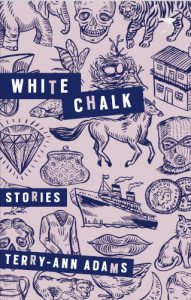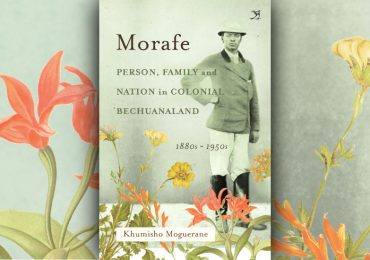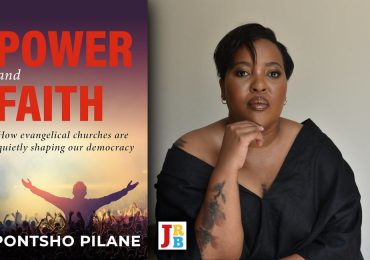The JRB Editor Jennifer Malec chatted to Terry-Ann Adams about writing, representation, and their new collection of short stories, White Chalk.

White Chalk
Terry-Ann Adams
Jacana Media, 2022
Jennifer Malec for The JRB: You have now written a novel (Those who Live in Cages, Jacana 2020) and this collection of short stories. Can you talk a little bit about the differences you experienced? I loved what you said in (the sadly departed) New Frame that in short stories the writer and reader ‘work together to come up with the ending’.
Terry-Ann Adams: I like how short stories can grab the attention of someone who’s not necessarily a ‘reader’. They get to experience all the emotions that a novel puts you through in thirty minutes. What I like about novels is that you can marinate, explore, walk around and bake. You have time and pages. You can fall in love with characters and then fall out of love all in the same book. The writing process for the two is the same as the reading. You labour over every development, every detail of your novel, while your short story has you running towards a finish line where everything must be present.
The JRB: You’ve said that you feel it’s almost a ‘duty’ to represent all kinds of people in your work. It seems to me your writing about people with albinism especially is compassionate without being overly tactful—writing truth seems to be your objective.
Terry-Ann Adams: For me, the truth is important because we have been fed so many books with lies, lies about our origins, our history, our culture. The truth is what we have right here, right now. And I am not writing sci-fi, I am writing lived experiences that are shared by many groups of people. So I owe them the truth.
The JRB: Your stories are often inspired by autobiography, and you also deal with a lot of traumatic subject matter. Do you find writing about these issues difficult, or cathartic?
Terry-Ann Adams: It depends on the story, sometimes it depends on the day. Writing about trauma feels like second nature to me because trauma and I are old friends. Thanks to therapy, I have learned to write about these things without leaving my guts on the floor. I’ve learned to channel my trauma into writing in a positive way.
The JRB: When your writing reaches beyond your personal experience, what kind of research do you do before you start?
Terry-Ann Adams: I talk to people. I’m usually very socially awkward but I’ve learned the value in hearing someone else’s story. For the story ‘The Last Supper’, for example, I spoke to a friend who had seen her gran live with Alzheimer’s. For ‘Madness and Civilisation’, I read up a lot about psychosis—while constantly checking in with my therapist.
The JRB: I absolutely love your use of language, and slang—’don’t jella vang tips!’ How do you envisage different audiences taking in this aspect of your work? You don’t make allowances for readers, but at the same time you don’t shut people out either.
Terry-Ann Adams: I love that I can introduce readers to my culture through language. Afrikaans is contentious to say the least but for me it is home. I want the reader to know me and my people by knowing how we speak because we are often made to feel ashamed of how we speak and of our accent. So I don’t want to alienate readers but instead bring them in.
The JRB: A story like ‘The Ouens’, which is one of my favourites, is a character study—the plot almost becomes secondary. Is this a part of writing you particularly enjoy?
Terry-Ann Adams: Yes, for sure! I love creating new people based on old people. It’s one of my favourite things about writing. Plot for me serves as a tool for character development. Maybe one day I will switch it up but ja, no, writing characters is first choice.
The JRB: Another of my favourite stories is ‘Fight Club’, which after I finished it I turned back to the title and suddenly got the joke. It felt like that story grew out of the title.
Terry-Ann Adams: My ideas come from lots of different places. Sometimes I choose a theme, like with ‘Red Roses’, and other times I’m like, ‘what if this happened?’, like with ‘Fight Club’ and ‘What’s this now?’ An errant forgotten conversation can pop up or I can read a book and see something in another writer’s world that I like.
The JRB: We see you playing with some of the tropes of short story writing in this collection. ‘Homecoming’, for example, contains that familiar ‘twist in the tale’, but with an optimistic slant. Did you enjoy the process of constructing the puzzle of these stories?
Terry-Ann Adams: I liked how Mohale Mashigo did it in Intruders. You never knew what was going to happen next. ‘Rock a Bye, Baby’ was the most interesting story to write because I had to accurately depict pregnancy and its effects on the body, while also building this emotional mountain that leads to the ending. I revised that story more than any other.
The JRB: You recently gave a lecture for the Great Texts/Big Questions series which looked at bell hooks’s essay ‘Love as the Practice of Freedom’. Reading that text in relation to your writing, a quote that stood out for me was ‘Choosing love we also choose to live in community, and that means that we do not have to change by ourselves.’ This idea of community, I think, is central to your work.
Terry-Ann Adams: Yes, the basis of township culture is community. ’n Mens is ’n mens deur ’n ander mens. That’s how I grew up. I also like to think of toxic communities, outcasts, the ones who get thrown away and how each community has a fixed hierarchy.
The JRB: Jennifer Platt wrote recently in the Sunday Times that you manage to ‘write authentically without second-guessing how to offer something universal’. Which do you think comes first—authenticity or universal appeal? Or is the latter inevitable if you perfect the former?
Terry-Ann Adams: The latter definitely is impacted by the former. People can tell a fake from a mile away. If we are going to talk representation then we must do it properly and that means prioritising authenticity. It’s a risk, but universal appeal will be real if you are.
The JRB: I believe you started out as a poet, before venturing into fiction. Can we expect to see a poetry collection from you in the future? Or—that dreaded question—what are you working on next?
Terry-Ann Adams: I am so self conscious about my poetry [laughs]. I still dabble, but it may be a few years before the world sees my poetry. On that dreaded question; I don’t know. Writing White Chalk was very emotionally taxing, especially in the time frame that I wrote it. So I don’t know, for now …
The JRB: And finally, since good writers tend to be good readers, I like to ask authors what books are on their bedside table. Is there anything you’ve been reading recently you’d like to recommend?
Terry-Ann Adams: I always have Scatterlings by Rešoketšwe Manenzhe and If You Keep Digging by Keletso Mopai on my table because the writing in both is so beautiful, delicate and honest. It’s calming. I recently borrowed my niece Joonie. She’s fourteen, it’s time she reads some Rayda Jacobs. And lastly Ougat by Shana Fife. It’s one of my favourite memoirs of all time.
- Jennifer Malec is the Editor. Follow her on Twitter.





